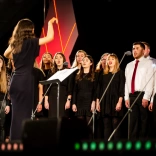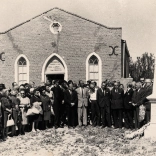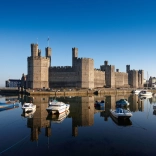When I was seven years old, we were set a task in the art section of our school eisteddfod – the yearly competition to celebrate the day devoted to St David, our patron saint.
“Draw a picture that means Wales to you,” our headmaster instructed us. My friend Sara sketched a daffodil. My pal Carol painted a pit-head wheel from a coal mine. And me? I drew Mervyn Davies, captain of the all-conquering Welsh rugby team of 1976.

I couldn’t separate my sense of Welsh identity from 15 red shirts and an oval ball then, and I can’t now – even if other sports can fly the flag for Wales on a global stage with similar pride. Who can forget Tour de France winner Geraint Thomas hoisting the red dragon aloft on the Paris podium? And the title of Most Famous Welshman on the Planet surely goes to footballer Gareth Bale, while his team-mates made an indelible impression as they reached the semi-finals of Euro 2016.
But I would argue that the way rugby is wrapped up in Welsh nationhood is unlike any other sport. If anything, rugby helped create Welsh nationhood. When the game took hold in the last years of the 19th century and thrived in the first years of the 20th, Wales embraced this relatively new sport because it gave a small nation the chance to be on top of the world.
Carolyn HittI couldn’t separate my sense of Welsh identity from 15 red shirts and an oval ball then, and I can’t now."
“This is a game that came from the English public schools into Wales and became the obsession of the working class,” explains historian Professor Gareth Williams. “From the 1890s we start to see big crowds of 30,000 to 40,000 at matches. The press coverage increases, people are travelling distances to watch matches and the whole club infrastructure is developing.
“We won the Triple Crown [beating England, Scotland and Ireland] for the first time in 1893 and then went into the Golden Era in 1900, winning the Triple Crown six times in the next 11 years. And, of course, the great triumph – and one of the pivotal moments in the cultural history of Wales – is the victory over New Zealand in 1905.”


That win over New Zealand’s All Blacks was certainly a titanic game, and one that left a lasting legacy – not least the tradition of singing national anthems at sporting fixtures. Wales introduced this choral ritual to the world after deciding to sing the Welsh national anthem as a tactical response to New Zealand’s terrifying war dance, the Haka.
Rugby got into the bloodstream around the same time as all the other components that formed the character of industrialised Wales. “The Welsh Rugby Union becomes a national institution as part of the drive towards national bodies at the end of the 19th century,” says Professor Williams. “The WRU takes its place with the National University of Wales, the National Library, the National Museum. These kinds of bodies represented the new sense of national consciousness and the WRU saw itself as very much part of that emerging national feeling.”

In the 1970s, Welsh rugby enjoyed a dazzling era of glory, which ensured the game became synonymous with Welshness beyond our borders. Such was the sport’s hold closer to home, Gareth Edwards – the greatest player of that decade – had a statue erected in his honour in Cardiff just four years after he had spun his final ball from the base of the scrum.
And the 21st century has brought Wales the kind of success that still ties the game to nationhood – from the Grand Slam and Six Nations championship successes of 2005, 2008, 2012 and 2013 to the World Cup semi-final of 2011.

The latter tournament saw the emergence of Ken Owens, a player who hails from the West Wales town of Carmarthen and one who relishes and respects the responsibility of representing his nation. He’s donned the red jersey 60 times, but it becomes more precious to him with every wear.
“The less time you have left in the shirt, the more you appreciate it,” he says. “The history of the jersey stretches back almost 140 years. It’s never your shirt: it’s the nation’s jersey. You’re only in it as a player for a certain amount of time. You cherish it and you’ve got to make sure you make your mark in it before you pass it on.”

For Ken, the bond between rugby and nationhood is never stronger than when those on the field connect with the fans in the stands through words and music. He says: “Singing the anthem is special. We’ve got a unique anthem, for a start. The words are different from most anthems.
“It’s not about a monarch or battles – it’s about the people and the country. So I feel it’s empowering as well. When you’re singing it with the thousands of people in the stadium, it’s their opportunity to be at one with the players. They feel part of us instead of just being supporters, as they are during the rest of the game. It’s an unbelievable experience.”


Ken, whose sister Vicky has also played rugby for Wales, remembers the first time he realised just what the game means to his country.
He says: “I’d just got into the squad when the enormity of it hit me. I came out of the house one morning and the binman who had never spoken to me before said, ‘Pob lwc penwythnos ’ma,’ which in English means ‘All the best this weekend.’ And that was the first time I grasped what rugby meant to Welsh people, and how much they care about it.
“It’s brilliant. It is a responsibility when you play for your country – at whatever level, you have a responsibility to do your best for the nation – but it’s not a burden. It’s something that you enjoy as a sportsman.”





